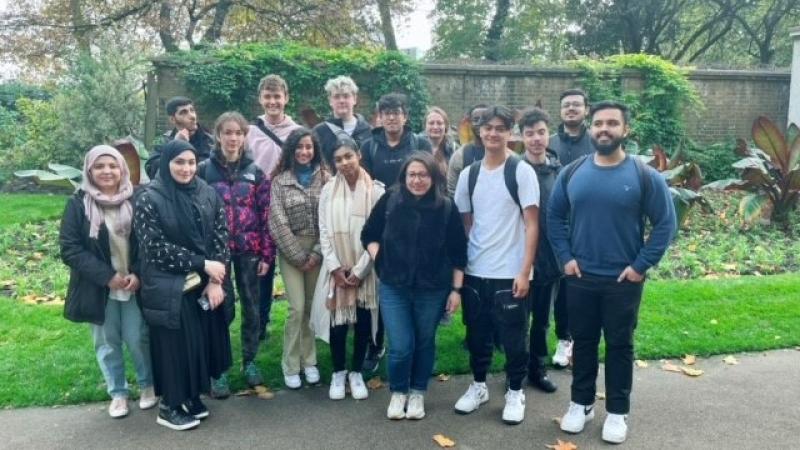Students on the Biological Sciences BSc Honours course were taken on a guided tour of Central London to learn more about the concept of sustainable city as part of the Designing a Sustainable World module.

The field trip was arranged and led by the leaders of the Designing a Sustainable World module, Dr Pooja Basnett and Dr Linda Percy. They took students to some of London’s most iconic sites and buildings, each with a unique contribution to sustainability.
The tour began at the Dominion Theatre next to Tottenham Court Road Station before progressing onto Central St Giles, a mixed-use development also in London’s West End. It has been recognised for its sustainability efforts and received several awards, including a European Leader Award in the 2016 survey by the Global Real Estate Sustainability Benchmark (GRESB), and has retained a prestigious Green Star. The building is designed to be energy efficient and features a range of sustainability-focused technologies and practices.
As the students were led through the City of Westminster and Covent Garden, they were introduced to London’s first ethical business hubs and the retailers who were challenging the fast-fashion status quo. They also stopped by Neal’s Yard and Remedies, a well-known health and beauty store, which embeds many sustainable practices into its business including a commitment to reducing waste, recyclable packaging, and the inclusion of ethically sourced and natural ingredients in their products.
The tour also took students to the London Transport Museum, also located in Covent Garden, which has implemented sustainable electricity generation methods as part of its commitment to reducing its carbon footprint and promoting environmentally friendly practices, including the museum’s use of solar panels.
A highlight of the tour for the students was discovering the city’s green spaces such as the community-run Phoenix Garden. The students were told that these green spaces play an important role in promoting sustainable living, as they provide clean air, shade, and a place for wildlife to thrive, as well as serving as a reminder of the importance of preserving nature’s heritage amid urban development.
The field trip ended at the Victoria Embankment, where students were shown some of the City of Westminster’s historic gas-lit streetlamps that are still in operation today. The lamps, which date back to the 19th century, were designed to run on energy-efficient and eco-friendly biogas before the concept of sustainability even existed.
Speaking about the field trip, Shashwat Guha, a Biological Sciences BSc Honours student, said: “The guided tour of Central London was an incredible experience that emphasised the city’s efforts to live sustainably. From visiting historic streetlamps and learning about the first planned sewers, to discovering ethical businesses and exploring tranquil green spaces, I was able to see the many ways in which London is committed to preserving its cultural heritage and promoting sustainable living.
“The tour was an eye-opening experience and left us with a newfound appreciation for the city. I am grateful to have participated in the field trip as a student of the 2022-23 cohort of Biological Sciences students at the University of Westminster. The passion and dedication of Dr Pooja Basnett and Dr Linda Percy was a major inspiration, and I am extremely thankful for their support.”
Dr Basnett added: “I think field trips can provide an authentic learning experience for students. We have had great feedback from the students who have been on these trips, and this motivates us to continue organising them. I enjoy them as much as the students.”
Find out more about Biological and Biomedical Sciences courses at the University of Westminster.
Learn about Westminster’s commitment to implementing the UN Sustainable Development Goals.
This article is based on a blog post by Shashwat Guha.


